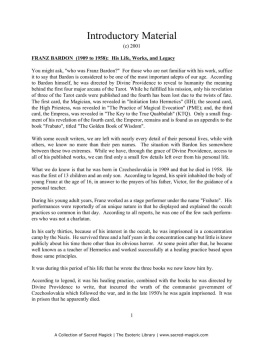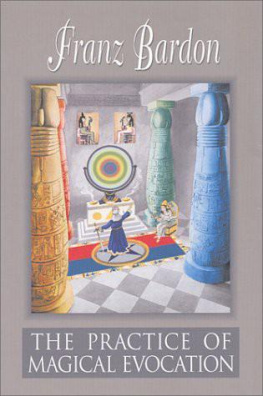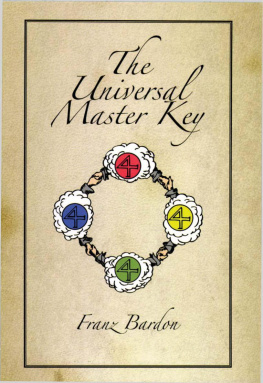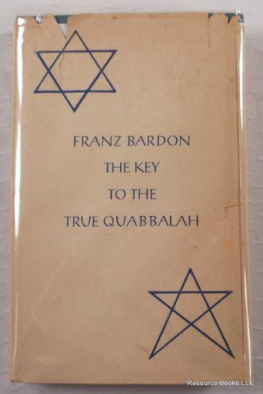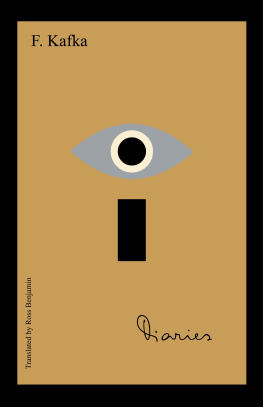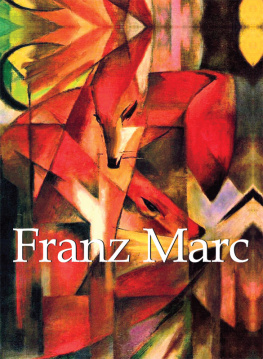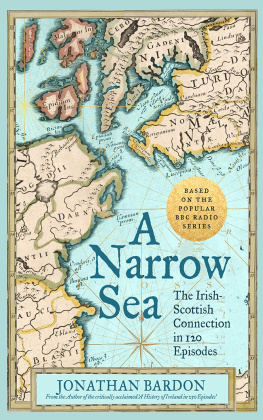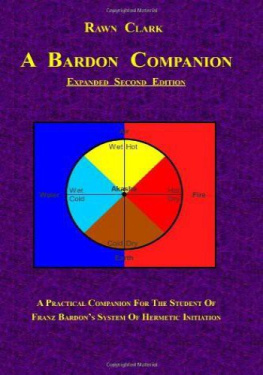Franz Bardon - INTRODUCTORY MATERIAL
Here you can read online Franz Bardon - INTRODUCTORY MATERIAL full text of the book (entire story) in english for free. Download pdf and epub, get meaning, cover and reviews about this ebook. year: 2002, genre: Religion. Description of the work, (preface) as well as reviews are available. Best literature library LitArk.com created for fans of good reading and offers a wide selection of genres:
Romance novel
Science fiction
Adventure
Detective
Science
History
Home and family
Prose
Art
Politics
Computer
Non-fiction
Religion
Business
Children
Humor
Choose a favorite category and find really read worthwhile books. Enjoy immersion in the world of imagination, feel the emotions of the characters or learn something new for yourself, make an fascinating discovery.
- Book:INTRODUCTORY MATERIAL
- Author:
- Genre:
- Year:2002
- Rating:4 / 5
- Favourites:Add to favourites
- Your mark:
- 80
- 1
- 2
- 3
- 4
- 5
INTRODUCTORY MATERIAL: summary, description and annotation
We offer to read an annotation, description, summary or preface (depends on what the author of the book "INTRODUCTORY MATERIAL" wrote himself). If you haven't found the necessary information about the book — write in the comments, we will try to find it.
INTRODUCTORY MATERIAL — read online for free the complete book (whole text) full work
Below is the text of the book, divided by pages. System saving the place of the last page read, allows you to conveniently read the book "INTRODUCTORY MATERIAL" online for free, without having to search again every time where you left off. Put a bookmark, and you can go to the page where you finished reading at any time.
Font size:
Interval:
Bookmark:
Introductory Material
(c) 2001
FRANZ BARDON (1909 to 1958): His Life, Works, and Legacy You might ask, "who was Franz Bardon?" For those who are not familiar with his work, suffice it to say that Bardon is considered to be one of the most important adepts of our age. According to Bardon himself, he was directed by Divine Providence to reveal to humanity the meaning behind the first four major arcana of the Tarot. While he fulfilled his mission, only his revelation of three of the Tarot cards were published and the fourth has been lost due to the twists of fate.
The first card, the Magician, was revealed in "Initiation Into Hermetics" (IIH); the second card, the High Priestess, was revealed in "The Practice of Magical Evocation" (PME); and, the third card, the Empress, was revealed in "The Key to the True Quabbalah" (KTQ). Only a small fragment of his revelation of the fourth card, the Emperor, remains and is found as an appendix to the book "Frabato", titled "The Golden Book of Wisdom".
With some occult writers, we are left with nearly every detail of their personal lives, while with others, we know no more than their pen names. The situation with Bardon lies somewhere between these two extremes. While we have, through the grace of Divine Providence, access to all of his published works, we can find only a small few details left over from his personal life.
What we do know is that he was born in Czechoslovakia in 1909 and that he died in 1958. He was the first of 13 children and an only son. According to legend, his spirit inhabited the body of young Franz at the age of 16, in answer to the prayers of his father, Victor, for the guidance of a personal teacher.
During his young adult years, Franz worked as a stage performer under the name "Frabato". His performances were reportedly of an unique nature in that he displayed and explained the occult practices so common in that day. According to all reports, he was one of the few such performers who was not a charlatan.
In his early thirties, because of his interest in the occult, he was imprisoned in a concentration camp by the Nazis. He survived three and a half years in the concentration camp but little is know publicly about his time there other than its obvious horror. At some point after that, he became well known as a teacher of Hermetics and worked successfully at a healing practice based upon those same principles.
It was during this period of his life that he wrote the three books we now know him by.
According to legend, it was his healing practice, combined with the books he was directed by Divine Providence to write, that incurred the wrath of the communist government of Czechoslovakia which followed the war, and in the late 1950's he was again imprisoned. It was in prison that he apparently died.
He left behind a wife (Marie), a daughter (also named Marie), a son (Lumir), and a group of direct disciples. And, he left us three very important books in the annals of occult literature: IIH, PME, and KTQ.
It is impossible to truly know the inner life of an adept such as Franz Bardon, but we can discern certain things from his life, from the testimony of those who knew him, and from his writings.
What stands out clearly for me is that Bardon's commitment to Hermetics was not about how great and powerful a guy he was. This sets him apart from many of his contemporaries and no where will you find braggartly statements about him other than from his disciples.
As evinced from what he wrote and what is known of his life, he was a humble, sincere and hon-orable man of great accomplishment. He was able to write down for all the rest of the world to see, a plainly spoken outline of the path of Hermetic Magic. Never before, and not since, has so comprehensive and so clear a guide been presented to the general public. Yet he managed to do this without touting himself as "The Magus of the Age", etc.
At the same time, Bardon was a very HUMAN being. He smoked heavily and experienced many difficulties with his health and life circumstances. I think it was perhaps these very experiences that enabled him to devise a path that was so accessible to the common man or woman. While his path demands that the student work to ennoble their character, he never resorts to judging the student's character himself -- that task he leaves up the student.
Nothing concrete is known about who Bardon's corporeal teachers were or from where he learned Hermetic Magic and Kabbala. A good amount of speculation has passed under that bridge but the fact of the matter is that this question is relatively irrelevant. Certainly parallels exist between Bardon's system and other important systems of practice throughout the world, but where Bardon's ideas originated has no real bearing upon the fact that his system has been proven to work.
Nevertheless, the question often arises as to what Bardon's "Hermetics" have to do with classical hermeticism. While his hermetics do derive from the body of writings known as the "Corpus Hermetica" (i.e., those ancient writings attributed to "Hermes The Thrice Greatest"), it takes a deep understanding of this work to see the similarities. The similarities are easier to detect with the later hermetic writings found in sources such as the "Kybalion" by Three Initiates, the
"Emerald Tablet of Hermes", the "Seven Hermetic Letters" by Georg Lomer, and the occult hermetics of his day. To Bardon, hermeticism is the science of occultism, based upon the teachings of the legendary figure known simply as Hermes.
With his book PME, the parallels between what he writes and the standard works on Solomonic magic, are very obvious. Yet even here, Bardon offers the student more than most authors. The same is true of his book KTQ. Many modern students of Kabbala don't even recognize KTQ as Kabbala, but in truth, Bardon's approach reaches back to a more original form of Kabbalistic practice. In this case, the "even more" that he gives the aspiring student is a universal Kabbala that is amenable to ANY language and therefore does not require the learning of biblical Hebrew.
Perhaps the greatest gift of Bardon's writing style is that he explains things in a very practical manner and does so without all the flowery language so prevalent in occultism. It is obvious from the outset, that the reader has found an author who speaks from long and deep experience instead of off the top of his head. The depth of his experience is often difficult for the reader to grasp, for he speaks, from beginning to end, from the perspective of someone who has done every stitch of the work for himself, and in this way he naturally conveys the concept that all he describes is obtainable, even easy.
Bardon wrote for both the common reader (one not really interested in hermetics other than as an intellectual oddity) and for the serious student of hermetic magic. Even someone who has had no previous experience with occultism can begin the work of IIH, since this work begins with the rudiments of initiation and gradually develops the student's magical abilities. Most who begin the work of IIH however, have had some occult training, but this is a two-edged sword, as it were, for often, the experienced occultist will find that they must unlearn some of what they have learned from other sources.
Of the many direct students that Bardon left behind, two are of special note. The first was his secretary, Otti Votavova, who was responsible for the book "Frabato" and for seeing to it that his writings remained accessible. While I have some problems with "Frabato" it is well worth reading if approached as a "Zanoni"-like occult novel. I find it hard to believe that Bardon would have said some of the things about himself that were said in "Frabato". To me, it seems that Ms.
Votavova's own love for her teacher amplified parts of Bardon's life out of proportion to their nitty-gritty reality. As I said, it is impossible to truly understand the inner life of so great an adept.
Next pageFont size:
Interval:
Bookmark:
Similar books «INTRODUCTORY MATERIAL»
Look at similar books to INTRODUCTORY MATERIAL. We have selected literature similar in name and meaning in the hope of providing readers with more options to find new, interesting, not yet read works.
Discussion, reviews of the book INTRODUCTORY MATERIAL and just readers' own opinions. Leave your comments, write what you think about the work, its meaning or the main characters. Specify what exactly you liked and what you didn't like, and why you think so.

